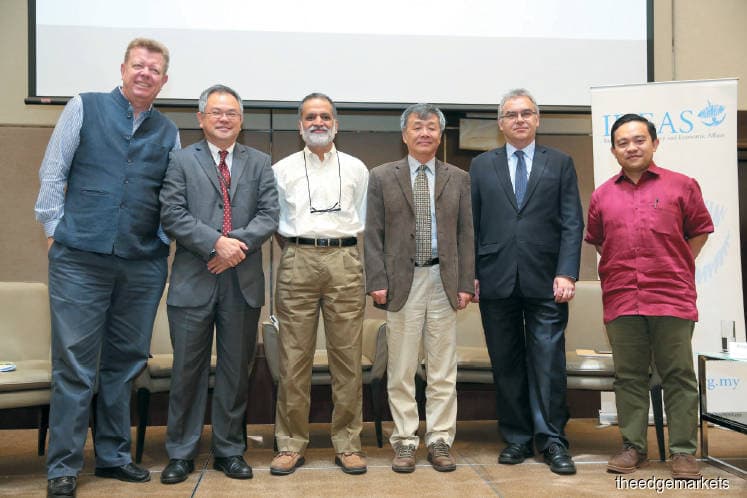
This article first appeared in The Edge Financial Daily on September 13, 2017
KUALA LUMPUR: As Malaysian Prime Minister Datuk Seri Najib Razak was to meet with US President Donald Trump yesterday, hopes have surfaced that the Trans-Pacific Partnership agreement (TPP) may be revived.
“Hopefully Trump will change his mind [about pulling out of the TPP] now that he is a bit more politically mature,” said Yong Hee Kong, senior adviser at Singapore-based Asean Advisory Pte Ltd of Zico Advisory.
Speaking to reporters at a symposium entitled “Retreating US, Rising China: How should we respond?” by the Institute for Democracy and Economic Affairs (Ideas) yesterday, Yong noted that Malaysia still has much to gain from the agreement.
However, he opined that the TPP could be stillborn as the remaining states were not interested in an agreement without the presence of the US.
Negotiations for the multinational trade agreement stalled early this year following Trump’s decision to pull out of the deal, leaving the remaining 11 states in the lurch.
Wan Saiful Wan Jan, chief executive officer of Ideas, agreed that it would be a success if Najib could convince Trump to return to negotiations on the TPP.
“I hope there will be some agreement on at least a bilateral deal between the two countries,” he told reporters following the symposium.
“However, it is a bit unfortunate that the visit will be clouded by allegations surrounding our government as well as Trump’s presidency,” he added.
Najib was set to meet Trump at the White House yesterday, a meeting that is expected to focus on security issues while steering clear of US investigations into state-fund 1Malaysia Development Bhd, Reuters wrote.
Meanwhile, Wan Saiful also noted that Najib’s visit to the US was important in showing that Malaysia was not taking sides between the US and China.
Malaysia’s dependence on Chinese investments was among the highlights at the Ideas symposium yesterday, where Wan Saiful stressed that it was important for the Malaysian government to be transparent about projects involving Chinese companies.
“What we need is the [enforcement of the] rule of law and proper governance of all investments coming into the country, which I’m sure will contribute towards Malaysia’s economic growth,” he said.
He added that Chinese investment is essentially a good thing seeing as how Malaysia is an open economy.
It was also important, Wan Saiful said, that Malaysia learn from the mistakes of encouraging too much state involvement in business.
Referring to Chinese investments as “chequebook diplomacy”, Yong said cheap financing was not a bad thing if managed well.
However, he highlighted that there is ample liquidity in capital markets that could be tapped as an alternative to such financing options.
“Government management is very important to prevent the construction of bridges to nowhere, or white elephants,” Yong said.
Meanwhile, Professor Sheng Hong, executive director at the Unirule Institute of Economics, China, highlighted that China’s state-owned enterprises (SOEs) are slowing down the republic’s economy.
China’s private sector has taken over job creation in the country as SOEs have not created new jobs since 2000, Sheng said.
However, despite their falling share of Chinese gross domestic product, Sheng noted that near-term reform of SOEs was unlikely due to the resistance posed by such companies.
Hence, the republic’s growth rate will continue to be supported by urbanisation, which is expected to continue growing for the next 15 to 20 years, and the new digital economy, Sheng said.